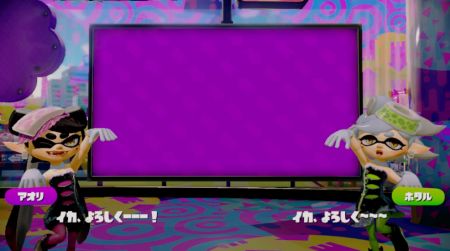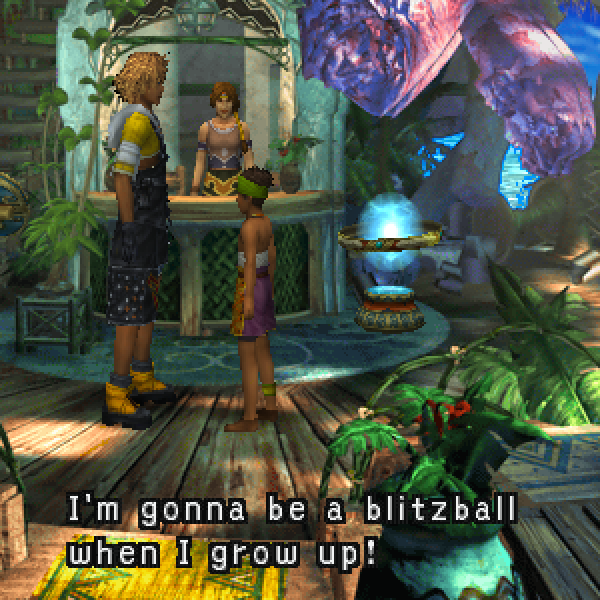A Legends of Localization reader named Keith sent in a question about Splatoon and one of the game’s famous catchphrases:
Just a quick one here- can you shed some light on what the original Japanese line is for the Squid Sisters in the Wii U game Splatoon? Specifically, they have the catchphrase “Stay freeeeeeeeesh!” which they say before you start the campaign. What did the translate this phrase from? Is there some kind of “fresh fish” pun involved, since the game is squid themed? Thanks.
I haven’t played Splatoon or seen much of it, but after a little bit of digging I found the answer. Here’s the scene side-by-side in Japanese and in English:
 |  |
| Splatoon (Wii U, Japanese) | Splatoon (Wii U, English) |
First, the English catchphrase is “Stay fresh!” For the non-native English speakers out there, this is a pun on the primary meaning of “fresh” and the slang definitions of “fresh”, which include:
- ”acceptable and highly approved by someone”
- ”very good and awesome”
- ”cool and stylish”
- ”to have attitude”
The Japanese catchphrase is quite a bit different: イカ、よろしく! (ika yoroshiku!)
In Japanese, “ika” can mean “squid” or “cuttlefish”, but there are several unrelated words that are also pronounced “ika”. In this case, the alternate “ika” is 以下, which means something like “after this” or “following this”. Unfortunately, “yoroshiku” doesn’t have a strong English equivalent, which makes the catchphrase difficult to translate.
Basically, “ika yoroshiku” roughly means something like “I appreciate your help following this”, “Let’s do well together in the thing that’s coming up”, or “I have high hopes for you coming up”, but in this case it also has a squid pun.
Even if the Japanese phrase had been more easily translatable, though, the squid pun probably would’ve been lost in translation anyway. The localizers’ solution was to come up with an entirely new phrase that was short, memorable, and had a squid-related pun. In this way, even though it isn’t a direct translation, it’s an equivalent catchphrase that hits all the intended notes.
Hopefully that clears up Keith’s question, but now I’m curious to know what the catchphrase is in other languages. If you know, please share in the comments!






I love this game. Because i can be a bit insane at times with my nerddom, i’ve actually worked to memorize the “squid-ese” lyrics to some of the game’s songs. It wasn’t easy, but now i can sing along to the songs while i drive to work in the morning.
http://splatoonwiki.org/wiki/Splatune_(Splatoon_Original_Soundtrack)#Lyrics
Haha, that’s cool, I didn’t know they had entire songs in that crazy language. I wonder if it somehow converts into Japanese in some way.
From what i’ve read, it’s just pure gibberish.
I also wondered if maybe it was a not-quite pun on “de wa” (with that…).
Spanish: “¡Nos vemos!”, which translates to “See you!”. I can’t see the pun though 🙁
Wow, the Spanish one flat-out doesn’t have a pun at all. Does Nintendo do different translations for Latin American and European Spanish?
yes, they do. one is purview of nintendo of america, and the other is nintendo of europe. oddly enough, most english translations are directly the american one, including such lines as “fanny pack”, (and “fanny” is almost as vulgar as “cunt” in british english) and things like “humor” instead of “humour”.
but spanish and french have always had separate american and european translations, which also came up in the “farting cabbages” thing in “french zelda”, which is only in one french version when it’s there at all.
though in more recent years i’ve noticed nintendo of europe having separate uk english localisations, in things like the streetpass games, i had thought nintendo’s censorship of concepts like demons was being more lax, but then i noticed an american friend playing the streetpass games, and almost all instances of “demon” in mine, were replaced with “dark” in theirs.
nintendo of europe seems to be a bit more lax about religious things, probably because ultra-conservative christians aren’t so much of a powerful group (not that they don’t exist), but since most games used (and most still do) the us english script files, that filters through to most european nintendo games too.
In my country, Chile, we have this catchphrase to say goodbye: “Chao pesca’o” (sic) which literally means “Bye fish”, I think it’s just the Chilean equivalent of the English “See you later, alligator”. I think it’d have been ideal for the game but unfortunately I guess that phrase is not used in other Latin American countries.
It would work as well in Venezuela, though the pronunciation would be more akin to “Chao pejca’o”
In french, it’s “À plus tard, calamars”, which literally translates to “See you later, squids”. I can’t see any pun in this whatsoever, which is surprising considering that everything else surrounding the squid sisters had a creative translation. For example, they go by the name of the “Calamazones”, which is basically “Calamar”(Squid) + “Amazones”(Amazons).
Also, Callie was renamed Ayo while Marie is now Oli. The two combined give out Aioli, which is often used for the seasoning of fishes or seafood (in France, anyway). This is pretty good, since calamari is the culinary name for squids, if I am correct. I guess since we only have the word “calamar” to speak about them (although people often mistakenly use “poulpe”, which actually means “octopus”), they changed it to aioli for the sake of cooking. They’d be damned as french people if they didn’t!
“À plus tard, calamars” sounds like a decent rhyme, and when you can’t find a pun, a rhyme is the next best thing.
Makes sense. “Stay fresh” is a good pun that works in English since it’s a mix of staying stylish/hip/trendy, which the game is aesthetically, and the fact you need to keep seafood fresh. XD
As for the Japanese phrase, I’ve always used “yoroshiku onegaishimasu” when I met and spoke to a few Japanese VAs for the first time at AX. Masakazu Morita said that I spoke Japanese very well after I politely introduced myself to him during an autograph signing.
That does seem to have no direct analog, but maybe something like “Let’s go!” or “Go team!” would be closest to such a phrase?
But, I like “stay fresh” (even with that phrase’s obsession with style in particular”, because it’s a fishy pun and it is more unique.
I wonder what the pun is with their Japanese names, Aori and Hotaru?
Aori and Hotaru are both specific types of squid – here’s some more info:
(Aori) https://en.wikipedia.org/wiki/Bigfin_reef_squid
(Hotaru) https://en.wikipedia.org/wiki/Watasenia_scintillans
Does anybody say “de geso” in the Japanese version? You know, just like Ika Musume?
In the same vein, I wonder if there are sentences of an unusual number (or unusually prominent) that end with “nai ka”. And if they spell it out in hiragana to make sure you see the “i ka” part.
In Italian they say “State in gambero!” The pun consists in the fact that they started from the expression “State in gamba” wich means rhoughly “stay cool” and replaced gamba with gambero, which means “shrimp”
Also, in Italian they are named Stella & Marina; stella marina is the italian for starfish
Stay fresh, cheese bags!
An excellent comment.